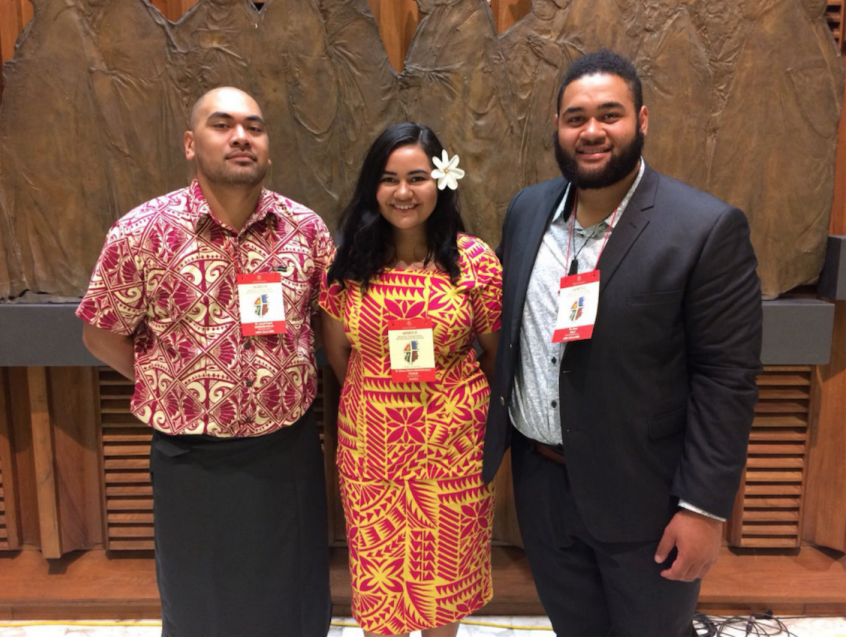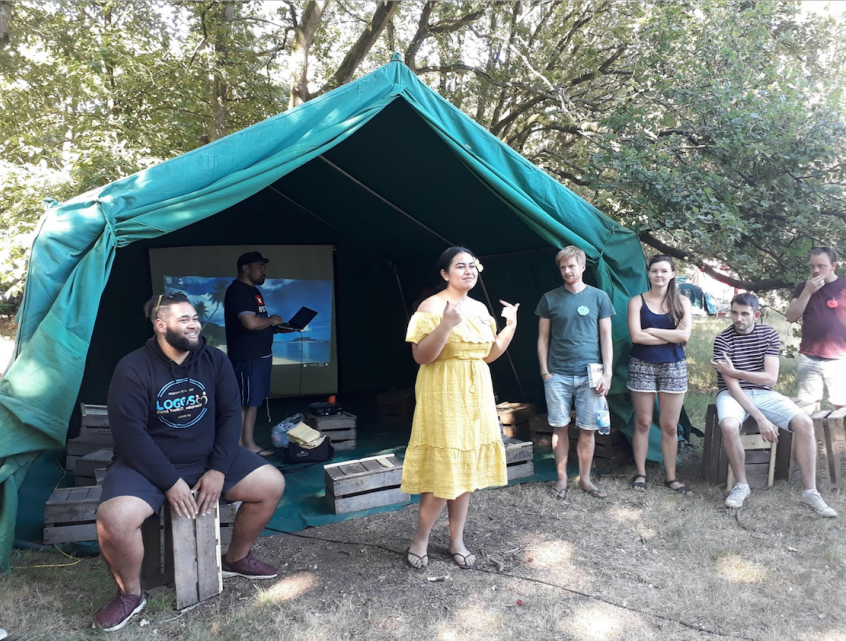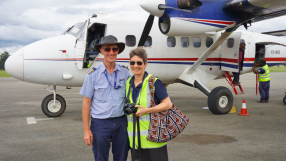Joseph Sapati Moeono-Kolio is from Samoa and is currently living in Aotearoa, New Zealand. He is a member of the Pacific Climate Warriors, a group of Pacific Islanders who refuse to have their homes, communities and cultures ceded to the effects of climate change. In partnership with CAFOD, they recently toured Europe, training young climate advocates in Poland and Belgium, visiting schools and meeting with political leaders in the United Kingdom and sharing their experiences and best practice insights at the Laudato Si' Conference at the Vatican, where they met with Pope Francis last week. Here, Joe shares a reflection on the state of our common home and our duty as Christians to protect it.

In his 2009 encyclical Caritas in Veritate, Pope Emeritus Benedict XVI wrote: 'The environment is God's gift to everyone, and in our use of it we have a responsibility towards the poor, towards future generations and towards humanity as a whole.'
His words expressed the Church's long-held view that our relationship with creation extended further than just being purely extractive and exploitative. It is an integral relationship, one where the dignity of any part of creation is intertwined with that of the other. It is one that is underscored by recognising that every corner of creation, of which humanity is but a part, is imprinted with the fingerprint of its Creator, testifying to the words of the Psalmist that 'The earth is the LORD's' (Psalm 24:1-2).
Understanding, therefore, that the very basis of our existence is both provisional and contingent upon the Creator, the natural inclination is to then ponder what humanity's role is as a part of this creation. From the very beginning, the Bible makes this abundantly clear: 'The LORDGod put the man in the Garden of Eden to take care of it and to look after it" (Genesis 2:15). Here, we see a clear illustration of humanity's intended relationship with creation. In being placed in the garden, we are both gifted the beauty and fruits of creation to enjoy but also charged with its upkeep and the health of the common home we all share with the rest of creation.
So how are we doing?
It's at this stage that views radically diverge. In the West, the answer to this has unfortunately varied according to ideological lines. While all are in agreement that for the most part, we have severely damaged the health of the planet, not all are ready to be convinced as to the scale of the damage offered up by the scientific community.
This is most evident in the debate on climate change. Despite the evidence that our habits of human consumption, usage of fossil fuels, over-production and waste is impacting the climate, not all have been convinced, for a variety of different reasons. Responses to the climate crisis range from apathy to complete denialism. What should be an issue that causes us to reflect more urgently on our status as stewards of the earth is now relegated to one that is used to fuel the growing rate of polarisation in the West.
The situation in frontline communities, however, paints a very different picture. Far from being just a matter for political debates, climate change is having very real human impacts all across the globe. For us on the front lines, climate change is neither a distant nor abstract concept. It is real, and it is now our lived reality.
Let me be clear – we have no interest in the ideological culture wars of the West, where the science of climate change is refuted more by politicians and pundits than actual scientists. We have no vested interest in the incendiary rhetoric of this debate, where toxic arguments from ideology distract from addressing the toxic environment which is our reality. We have no dog in that fight. What concerns us is that which is playing out before our very eyes – the erosion of our islands and with it, the inheritance of our future generations. What concerns us is the lack of focus and, thereby, the lack of urgency.

There are obviously many sides to this issue and the different approaches and narratives that colour it. It is more than cold data and even colder economic models – it is a human issue first and foremost. Climate change is Cyclones Winston and Gita flattening Fiji and Tonga, and destroying the infrastructure of our island nations on an almost annual basis. Climate change is the washing away of the graveyards of our ancestors and the erosion of the futures of our children. It is wildfires in California, droughts in Pakistan and Syria, more hurricanes like Irma and flooding in Florida.
Climate change changes more than just the climate. The stress caused to our common home fractures our communities and displaces our families. We must remember that in the noise of political arguments and ideological narratives, we do not forget nor become desensitised to the suffering of human beings at the centre of this crisis. At a deeper level, climate change is the manifestation of our failure to protect the garden we were tasked with keeping.
'Francis, rebuild my house for it has fallen into disrepair,' St Francis of Assisi was told.
Yet even as our home falls into disrepair, our resolve to fix it must not fail. Our faith now summons us to rise to the occasion, to stand by all in our home who are vulnerable and to begin again the task of rebuilding it. S. Francis of Assisi was given this great task 800 years ago.
Now, in the gathering clouds of uncertainty, we are once again called – this time by another Francis – to have the courage to stand. In his landmark encyclical Laudato Si', Pope Francis reminds us that care for the environment is infinitely tied to concern for the poor. It is also a matter of intergenerational justice, for when we 'start to think about the kind of world we are leaving to future generations, we look at things differently; we realise that the world is a gift which we have freely received and must share with others' (Laudato Si', 159). This must now be at the centre of our outlook on the current crisis – the human face of climate change and what that means for future generations.
The upkeep of our common home is our collective duty. Last week's Laudato Si' conference in Rome brought together the world's leading climate scientists, civic, faith and business leaders as well as representatives from indigenous communities on the front lines of climate change. The voices of remarkable young people from around the world resounded the call for more ambitious action, a reminder that it is our generation and the ones still to come that will inherit the fruits of our actions here and now. The Pacific Climate Warriors – Pacific Islanders connected by our common purpose to protect our island homes – is one such group rising to the challenge, building the groundswell of grassroots community-led climate action in order to influence the decisions that will ultimately shape our future.
Among the campaigns that the warriors have spearheaded is the '1.5 to stay alive' campaign that gave voice to our perilous reality during the 2015 COP21 negotiations and has subsequently become embedded in the climate action vernacular. 1.5 to stay alive encapsulates the simple fact that a rise in the earth's average annual temperature to anything more than 1.5˚C would spell disaster for many of our island communities. It is more than just a slogan, it is the truth upon which our ability to exist hangs in the balance.
We travelled to Europe for almost three days in order to press the urgency of the situation and the need for our elders – to whom we traditionally look to for guidance and leadership – to steer our collective canoe away from its current trajectory, to chart a new course towards a more sustainable future.
This spirit must now be carried forward into the upcoming Global Climate Action Summit in San Francisco, a city named after St Francis of Assisi, later this year. This is our next opportunity to mobilise the different spheres of climate action, which must be sustained ahead of the G20 Summit in Argentina and COP24 in Poland. These gatherings in populous Christian nations present us with the chance to put our faith and these principles into action and to fulfil our moral duty as stewards of creation. Beyond these high-level meetings, the grass roots mobilisations of people of faith, young people, indigenous communities and climate action groups around the world must continue to energise the march towards environmental justice.
'The one who has hope, lives differently,' said Pope Emeritus Benedict XVI.
Courage, dear friends. Above all else, we must not be disheartened or give way to cynicism but be resolute in our commitment to fighting the injustice of climate change. Although the road is long and the work difficult, we cannot lose our hope – we are after all, people of faith. 'For I am the LORD, your God, who takes hold of your right hand and says to you, Do not fear; I will help you' (Isaiah 41:13). Our faith in Christ both compels us to action and comforts us in the many moments of doubt and frustration. As we reflect therefore on our role as stewards, let us think of those who stand at the front lines of the current crisis, resolve to committing ourselves more fervently to fighting this threat and be comforted in the knowledge that our cause is just.
Finally, we ask that you remember us – the human faces of climate change. See us. Partner with us. Rise with us. On September 8, 2018, the Pacific will rise again once more to join the global fight that is threatening our homes, our cultures and our very way of life. Across the globe, we are calling on people to add their voices to the global chorus for real climate action. For that is the true calling of those of us who profess to follow Christ: to rise up against injustice and to stand in solidarity with the most vulnerable.
We in the Pacific are more than just cyclones, king tides and the current threat of climate change. We have always been more. We are families. We are communities. We are the memories of our ancestors and we are the saltwater that runs through our veins. My friends, let it be well understood – we fight not only for the future of our homes, but for the future of yours as well. The inheritance of our children and grandchildren is cause for our inner conversion, to re-examine ourselves and to stand together, for that is the true meaning of solidarity.
We are more than drowning islands, we are voices from the peripheries calling out to you in the West to remember your role as stewards of God's creation – calling on you to have the courage to act.
'...For the land is mine. And in all the country you possess, you shall allow a redemption of the land' (Leviticus 25:23-24).













